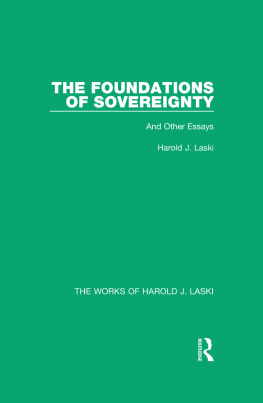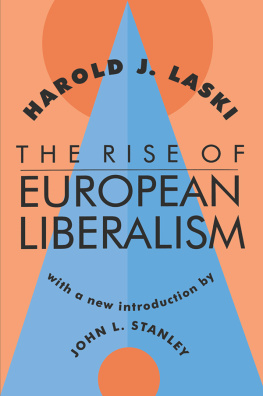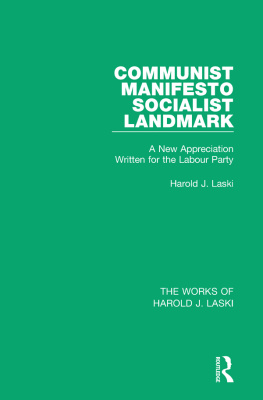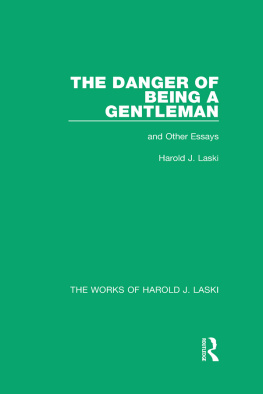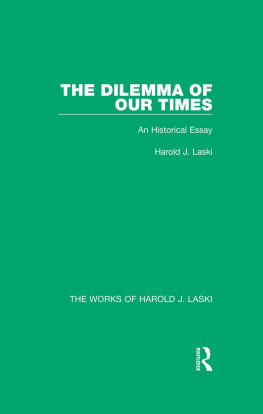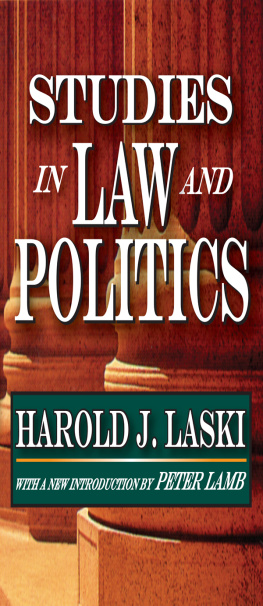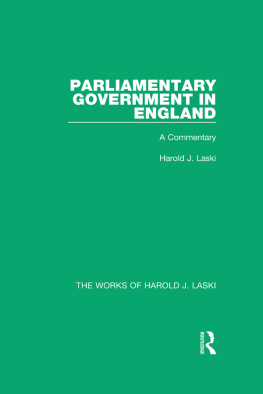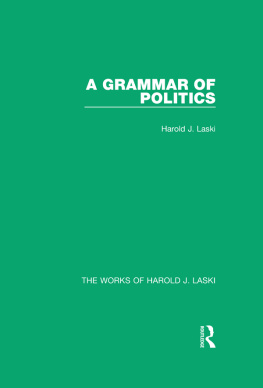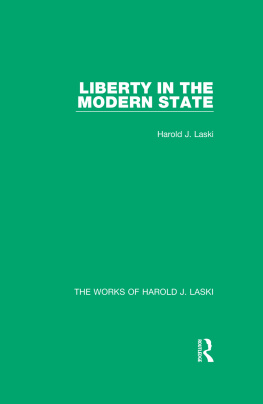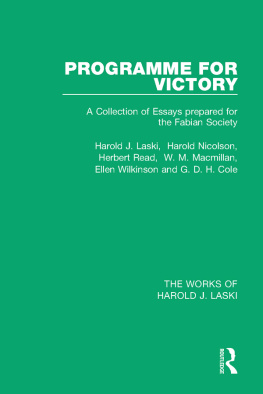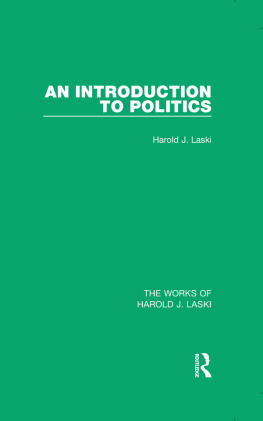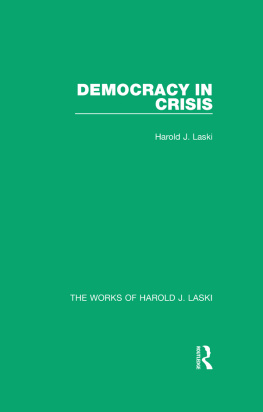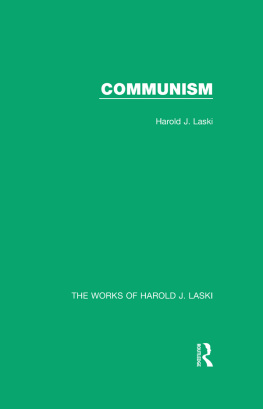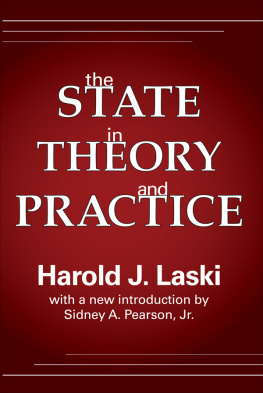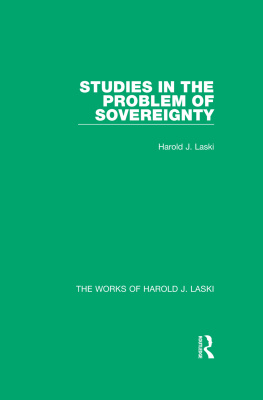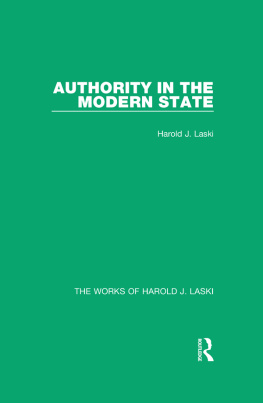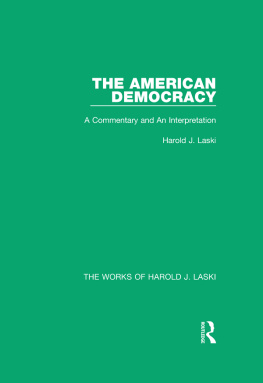THE WORKS OF HAROLD J. LASKI
Volume 3
THE FOUNDATIONS OF SOVEREIGNTY
First published in 1921
This edition first published in 2015
by Routledge
2 Park Square, Milton Park, Abingdon, Oxon, OX14 4RN
and by Routledge
711 Third Avenue, New York, NY 10017
Routledge is an imprint of the Taylor & Francis Group, an informa business
1921 Harcourt, Brace and Company, Inc.
All rights reserved. No part of this book may be reprinted or reproduced or utilised in any form or by any electronic, mechanical, or other means, now known or hereafter invented, including photocopying and recording, or in any information storage or retrieval system, without permission in writing from the publishers.
Trademark notice: Product or corporate names may be trademarks or registered trademarks, and are used only for identification and explanation without intent to infringe.
British Library Cataloguing in Publication Data
A catalogue record for this book is available from the British Library
ISBN: 978-1-138-81912-2 (Set)
eISBN: 978-1-315-74273-1 (Set)
ISBN: 978-1-138-82184-2 (Volume 3)
eISBN: 978-1-315-74267-0 (Volume 3)
Publishers Note
The publisher has gone to great lengths to ensure the quality of this reprint but points out that some imperfections in the original copies may be apparent.
Disclaimer
The publisher has made every effort to trace copyright holders and would welcome correspondence from those they have been unable to trace.
COPYRIGHT, 1921, BY
HARCOURT, BRACE AND COMPANY, INC.
To MY FRIEND
ROSCOE POUND
DEAN OF THE LAW SCHOOL IN HARVABD UNIVERSITY
WITH
ABIDING AFFECTION
I
THE essays printed in this volume are part of an attempt at the reconstruction of political theory in terms of institutions more fitted to the needs we confront. Broadly speaking, they are part of the case for what is coming to be called the pluralistic state in contrast to the unified sovereignty of the present social organization. But they are only part of the case. The industrial and psychological inadequacy of the existing rgime is briefly discussed in the second of these papers. Since that was written, the evidence given before the Royal Commission on the Coal Industry and the Inquiry into Dockers Wages have shown that the institutional reconstruction will inevitably be more thorough-going than I there, writing in 1918, imagined. What evidence we have from the European continent, particularly from Russia and Germany, makes it evident that the classic system of representative government has reached its apogee. What we need above all is inventiveness in the social, legal, and political matters that are discussed in these essays.
It is a matter of no small interest to speculate upon the direction from which that inventiveness is likely to come. Despite the great service rendered by the philosophers to political science, they have studied rather the form than the substance of the state. This has meant an undue emphasis upon purpose as distinct from the fulfillment of purpose. It has led to an analysis of the pure instance, rather than an analysis of the actual experiments with which history presents us. That is why the attitude of the philosopher has been so similar to that of the lawyer. The rights studied by the latter take their origin from a set of historical circumstances which the lawyer, from his standpoint naturally, is able to ignore. They differ from the study of right. But it is upon the latter problem that our attention must today be concentrated.
For we have found that a state in which sovereignty is unified is morally inadequate and administratively inefficient. It depends upon an intellectualist view of the political process which is not, as Mr. Graham Wallas has shown, borne out by the facts. It assumes that the government is fully representative of the community without taking account of the way in which the characteristics of the economic system inevitably perverts the governmental purpose to narrow and special ends. It assumes that the problems of the modern state admit of general solutions; the fact surely is that the essential problem is the different way in which those general solutions can be administered. Nor can the average voter be said to transcend his own interest by merging himself into a larger whole with the result that a general will is secured. Here we have been led astray by the facile brilliance of Rousseau. The more carefully the political process is analyzed, the more clearly does it appear that we are simply confronted by a series of special wills none of which can claim any necessary pre-eminence. In particular, it does not sufficiently investigate the moral character of governmental acts. The objectivity, for example, of the interpretations issued by the British government during the railway crisis of 1919 can only be fairly judged by the careful scrutiny of individual citizens. In politics, above all, there is no a priori Tightness.
Nor is this all. The monistic state-philosophy too little investigates the relation of the citizen-body as a body capable of, but rarely exercising, judgment upon policy. The investigations of the Sankey Commission, for example, have shown how vast is the unrealized experience which lies waste in the autocratic management of industry. That waste is not less true of government departments. Once, at any point, work is divorced from responsibility the result is a balked disposition of which the consequence is to diminish the creativeness of the worker concerned. The hierarchical structure of the present state maximizes this loss. Nothing is more clear, for example, than the existence of a law of diminishing administrative returns. An official cannot be charged with business over a territory beyond a certain size without administering less efficiently for each addition to his work; and no amount of efficiency at a central office will morally compensate for the inferior interest in the result obtained of those who have had no effective share in making it. The appreciation of this is one of the most vital factors in Mr. Justice Sankeys scheme for the nationalization of British mines. And this is true not merely of industry alone. The departmental organization of every monistic state becomes over-centralized; and this, as Lamennais aptly said, results in apoplexy at the centre and anaemia at the extremities. For the inevitable consequence of centralization is an attempt to apply uniform and equal solutions to things neither uniform nor equal.
The pluralistic state is an attempt to remedy these defects by substituting coordination for a hierarchical structure. Mainly it must be based upon a study of the impulses which are at work in the business of production and the channels we have erected for the satisfaction of those impulses. We must start from the admission that the allegiance of man is diverse and that where his loyalties conflict it is ultimately both safer and better for the community that this instructed conscience should be the source of his decision. It would follow that there is no such thing as the sovereignty contemplated by law in any sense which admits of practical political application. In actual fact what we meet is a variety of interests, functional and territorial; and the way in which they are related suggests the necessarily federal character of all government. The main advantage of this federal structure is that it affords better channels for the operation of an active consent upon the part of citizens than any other method. Nor must this federalism be conceived in merely spatial terms. It applies not less, say to the government of the mines than to the government of Ireland or of Massachusetts. Ultimately it suggests not only a partition of sovereignly in terms of function but also a complete revision of the accepted notion of property. Ultimately, also, it suggests a rough division between the two great functions of production and consumption in which supreme power is divided between the two. Where the interests of each touch upon the other, it is clear enough that some mechanism of ultimate adjustment will be needed; but the main thing is to avoid a system in which supreme power is concentrated at a single point in the body public.

